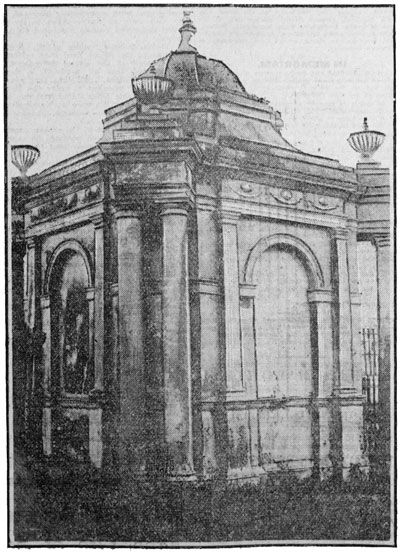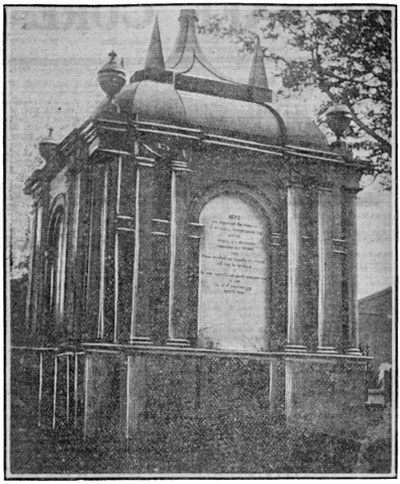Belfast Evening Telegraph, Wednsday, October 24, 1906
III -- Newtownbreda Churchyard
So interested did I become that I began to widen the circle, and my next visit was to Newtownbreda, where the churchyard is delightfully situated on the skirts of Belvoir Park, once the residence of Lord Deramore. The big trees provide the hilly lane with a natural awning of refreshing green, and a great part of the burial-ground is thrown into cool shadows by the same generous provider.
There is every evidence here of an attempt to preserve the ancient stones with which the place abounds; but apparently the effort has started too late, and some are beyond redemption. A peep into the interior of the church, known as Knockbreda, will show that cleanliness and order is a feature of the entire establishment. To the right of the church as you enter the grounds there is a square stone arrangement much broken and dilapidated, which is said to have been transferred from Jerpoint Abbey, and the date is given as 1180, but from inquiries there is no very definite information to be gained regarding the subject of the memorial. On one end there are the outlines of three coffins, each bearing the initials -- E. H., S. C., J. C. -- but the identity of the owners thereof seems lost for ever. So I go forth among the graves to find for myself something more suitable. I am immediately rewarded. Almost the first I examine is to the memory of
WIDOW GENTLE,
Who died in 1822, at the age of 52 years.
Those particulars are supplemented with a short poem where the author has struck the warning note. As it is written in the "first person," it may be surmised that the widow herself composed the verse before her demise and left instructions for its inscription on her tombstone. It is just what a lady named "Gentle" would be expected to do. Here is the verse:--
Once I stood where thou dost now,
And viewed the dead as thou dost
me, Ere long thoult lie as low
as I, and others stand and look
on thee.
I give the lines as they are engraved on the stone, and the arrangements as very peculiar. It is puzzling at first, but once having assimilated the sentiments expressed in the lines, and mastered the poetical qualities, there is no mistaking the force of the prophecy. We all must come to that some day.
Close by we have "William Wilson White Smith, who died 1803, and William, Junr., 'a most promising boy.'" It is indeed out of the ordinary to have one's virtues recorded in this simple fashion unless at the public expense. Modesty generally prevents relatives indulging in laudatory notices, but when the public erect a memorial they like to have as much virtue set forth as the subscriptions will admit of. It is a very nice trait in our national character, and we out to be proud of it.
It is surprising to find such a number of monuments of more than average importance in this out-of-the-way place, but it may be to some extent explained when it is remembered that Newtownbreda was a sort of Mother Church to Ballymacarrett, and many of the inhabitants of the latter place were buried here. On all sides are colossal erections of the most elaborate design and wonderful workmanship. Strong, substantial structures, which show the owners to have been persons of means. Near the centre is
THE BATESON ENCLOSURE
with its simple flat stones, all of similar design and shape. The Batesons, now the Deramores, are, of course, very closely connected with the progress of the city, one of the family being a partner in the first bank opened in Belfast in 1752. The Wallaces of Beechmount, the Coates' of Glentoran, and many other important people bury there, but perhaps one of the most interesting is that of the Cunningham family. The first name to meet the eye is Waddell Cunningham, who, it will be remembered, figured so prominently during the troublous times with the "Hearts of Steel". One of the members was arrested and lodged in the military barracks. His surrender was demanded and refused, where-upon the mob turned to Waddell Cunningham's house and set it ablaze -- the house occupied the site of the present Provincial Bank in Royal Avenue, then Hercules Street. He died in 1797 at 68 years of age, so that his life must have been an eventful one, since he took such a prominent part in the local administrations. Revolutions were cheap in those days, but with the French at Carrickfergus in 1760 and Paul Jonesin Belfast Lough in 1778, not to mention such minor happenings as the meal riots of 1756 or the visit of Mrs. Siddons in '85, he may be said to have had a very exciting time.

THE GREGG MEMORIAL
The Gregg family (one of whose members was a colleague of Waddell Cunningham) are also well represented, and the photograph published herewith shows their magnificent memorial at Newtownbreda.
The two names, Cunningham and Gregg, are to be found coupled in some of the "Hearts of Steel" ballads. For instance:--
"Donegall all his tenants may plunder and fine,
And a Gregg and Base Cunningham aid the design,
Then the mischief they breed with such terrible zeal
Then falsely impute to the poor Hearts of Steel."

THE WADDELL CUNNINGHAM MEMORIAL
Here is a modern instance of our hot-headedness. It is a memorial erected by the members of Purdysburn Flute Band to the memory of a member, R. H. McDowell, aged 17 years, who was killed in an attack on the band in Belfast in the year 1882. And not far from this lies the remains of John Herdman, who was cruelly murdered at his own gate at the lodge house in 1862.
From these harrowing pictures we turn to one which is remarkable in our local history, and that is the flat stone which lies on the left of the church.
PUBLIC GRATITUDE.
Erected
This Stone
to the
Memory
of
Richard Cox Rowe,
A celebrated Comedian,
Who was born in Dublin in the year
MDCCLIV.,
and
Died in Belfast,
where he was universally admired
on account of his merits as an actor
and
his gentleness of manner
as a man,
on the seventh of May,
MDCCXCII
________
Reader, if talents could ever beguile
Thy bosom of cares and instruct thee the while,
If e'er thou wasn't claimed from dull anguish and woe
Pay a sigh -- as a debt -- o'er the relicks of Rowe.
Richard Cox Rowe figured as one of ten literary members in the picture of the Adelphi Club, 1782, and this memorial is probably unique as showing that in those days our people were more broad-minded than we usually give them credit for. There are many stones erected to people who lived and died during the early part of the eighteenth century, and in most cases the records are well preserved. One especially is to the memory of
Peter Stuart,
late Town Mayor of Belfast
who died in 1864, aged 94 years.
Although he may not have been born here, he lived in what perhaps might be termed the richest position of the world's history, when geniuses in every branch of art and science were writing their names on the tablets of fame -- the days when Stephenson was experimenting with "The Rocket," when Telford and Brunel were accomplishing marvels of engineering skill, or when Parry and Franklin were exploring the White North. "When George the Third was King" public executions, the pillory, the whipping post, and the parish stocks were common features in the social life in England. He lived to see the Americans fighting for and gaining their independence. In the days of Pitt, and Burke, and Sheridan, and Fox, when the legislation of the Irish Parliament led up to the '98 rebellion, with the accompanying horrors of Enniscorthy Bridge and Vinegar Hill. He shared the times of Wellington and Nelson, and saw Napoleon rise to the highest heights of his ambition, only as a prelude to his ignominious downfall. All these pictures of war and desolation framed in the memories of those literary giants of whom the nineteenth century was particularly fruitful -- Tennyson and Macaulay, Freeman and Darwin, Carlyle and the Brownings -- only to mention a few of the historic names. Even our own town was excited in sympathy with other parts of the kingdom.
With these thoughts surging through my mind, I descend the steps of Newtownbreda, and live for the time being one hundred years ago, until the tinkle of the tram bell on the distant road awakens me to the fact that we of the present day are reaping the benefit of the experience of those who lived before us.

